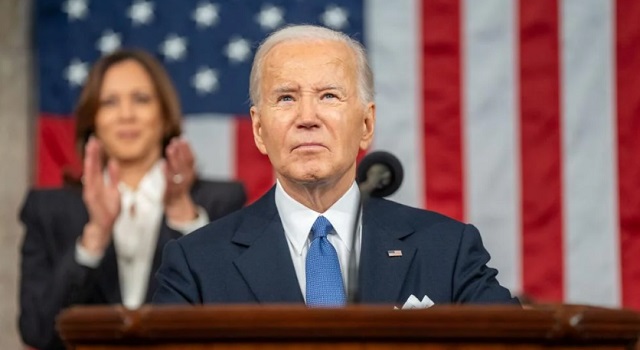International
BIDEN OUT: President exits race, endorses VP Harris as his successor

From The Center Square
President Joe Biden ended his bid for reelection Sunday, opening the door for Vice President Kamala Harris or another top Democrat to replace him atop the ticket.
In a statement posted to X, Biden said he is stepping aside “in the “best interest of my party and the country.”
“It has been the greatest honor of my life to serve as your President,” Biden said. “And while it has been my intention to seek reelection, I believe it is in the best interest of my party and the country for me to stand down and to focus solely on fulfilling my duties as president for the remainder of my term.”
The historic withdrawal comes just weeks before the Democratic National Convention is set to take place Aug. 19 in Chicago, where Biden’s pledged delegates will face tough decisions on who to replace him with.
Concerns over Biden’s age, declining cognitive abilities and physical health led more and more elected Democrats in Congress to call for his exit, seemingly on a daily basis.
Biden’s support among Democrats began to freefall after his performance in the June 27 debate with former President Donald Trump, when Biden stumbled over his own words and often lost his train of thought.
At a NATO news conference a couple of weeks later, Biden referred to Kamala Harris as “Vice President Trump” when asked if he thought Harris was ready to be president if he were to step aside, one of many gaffes during the summit.
During the Republican National Convention in Milwaukee last week, where Trump officially accepted the GOP nomination for president just days after a failed assassination attempt on his life at a campaign rally in Pennsylvania, Biden was hunkered down at his Delaware home, recovering from his third bout with COVID-19.
Biden has not fared well in 12 major polls tracking the 2024 general election in recent weeks, leading down-ballot Democratic candidates for Congress to raise concerns that his declining support could help Republicans to retake the White House and the U.S. Senate and solidify their majority in the U.S. House.
Trump led by an overall average of 3 points in the 12 polls. Biden only led in one poll, where he had a 2-point edge in the NPR/PBS/Marist poll. Trump and Biden were tied in the ABC News/Washington Post poll. Trump led in the 10 other polls as of Thursday.
In The Center Square Voters’ Voice Poll of nearly 2,300 likely voters, conducted after the June 27 debate but before the attempted assassination on Trump, Biden’s deficit grew to three full percentage points nationally. The poll has a margin of error of 2.1%.
Until Sunday, Biden defiantly opposed calls to step aside.
While his June debate performance seemed to seal Biden’s fate, his deteriorating cognitive abilities made news months earlier.
In February, the Report of the Special Counsel investigating Biden’s taking classified documents to his home revealed the president had issues with his memory.
“We have also considered that, at trial, Mr. Biden would likely present himself to a jury, as he did during our interview of him, as a sympathetic, well-meaning, elderly man with a poor memory,” the report stated.
The report also stated, “Mr. Biden’s memory also appeared to have significant limitations – both at the time he spoke to [Biden ghost writer Mark] Zwonitzer in 2017, as evidenced by their recorded conversations, and today, as evidenced by his recorded interview with our office. Mr. Biden’s recorded conversations with Zwonitzer from 2017 are often painfully slow, with Mr. Biden struggling to remember events and straining at times to read and relay his own notebook entries. In his interview with our office, Mr. Biden’s memory was worse. He did not remember when he was vice president, forgetting on the first day of the interview when his term ended (‘if it was 2013 – when did I stop being Vice President?’), and forgetting on the second day of the interview when his term began (‘in 2009, am I still Vice President?’). He did not remember, even within several years, when his son Beau died.”
International
Trump puts new price tag on Canada joining “Golden Dome”

Quick Hit:
President Trump has upped the cost for Canada to join the U.S. “Golden Dome” missile defense program to $71 billion—$10 billion more than his previous ask.
Key Details:
- Trump confirmed the new $71 billion figure while speaking to reporters aboard Air Force One.
- Canada has pushed back, with PM Mark Carney and diplomats calling Trump’s offer a “protection racket.”
- Trump said Canada could access the system for free if it became the 51st U.S. state.
Diving Deeper:
President Trump has put a new and steeper price on Canada’s potential entry into America’s “Golden Dome” missile defense program. Speaking from Air Force One on Monday, Trump told reporters, “They want to be in… Seventy-one billion they’re going to pay.”
That’s a $10 billion increase from the $61 billion figure Trump had previously floated, marking a sharp escalation in his negotiations with Ottawa. The Golden Dome, described by the administration as a “state-of-the-art” defense shield, aims to protect North America from a new era of missile threats—particularly those posed by China, Russia, and North Korea.
Trump has framed the Golden Dome as the long-awaited realization of Ronald Reagan’s “Star Wars” vision, using space-based sensors and interceptors to strike down incoming ballistic, cruise, or hypersonic missiles. Development timelines suggest full deployment is still 5–7 years off, but an initial $25 billion is already allocated in next year’s defense budget. The entire project may run upwards of $175 billion, with some estimates as high as $542 billion over 20 years.
Canada, which has long partnered with the U.S. under NORAD to detect airborne threats, has expressed interest in joining the project. But Trump is demanding a separate, costly buy-in. He reiterated that Ottawa would “have to pay a lot of money” to participate unless it pursued a full political union with the U.S. “It would be free if Canada became the 51st state,” he added.
Canadian leaders have pushed back hard. Prime Minister Mark Carney, re-elected in April after campaigning against U.S. interference, said Canada wants to protect its citizens but not under terms dictated from Washington. Ambassador to the U.N. Bob Rae went further, calling Trump’s offer a “protection racket.”
conflict
Trump dismisses US intelligence that Iran wasn’t pursuing nuclear bomb before Israeli attack

From LifeSiteNews
By Dave DeCamp
When asked about Tulsi Gabbard’s assessment, President Trump said, ‘I don’t care what she said. I think they’re very close to having [a nuclear weapon].’
Ahead of Israel’s attacks on Iran, U.S. intelligence assessed that Iran was not pursuing nuclear weapons and that even if it chose to do so, it would take up to three years for Tehran to be able to produce and deliver a nuclear bomb against a target of its choosing, CNN reported on Tuesday, citing people familiar with the intelligence.
The U.S. assessment goes against the claims from Israeli Prime Minister Benjamin Netanyahu, who launched the war under the pretext of preventing Iran from obtaining a nuclear weapon. But President Trump appears to be taking Israel’s word over his own intelligence agencies, as he told reporters that he didn’t care about his director of national intelligence’s assessment on the issue.
In March, DNI Tulsi Gabbard said that “Iran is not building a nuclear weapon and Supreme Leader Khamenei has not authorized the nuclear weapons program he suspended in 2003.” Her assessment was reflected in the Intelligence Community’s annual threat assessment.
When asked about this assessment, President Trump said, “I don’t care what she said. I think they’re very close to having [a nuclear weapon].”
Netanyahu claimed in an interview on Sunday that he shared intelligence with the U.S. that Iran could have developed a nuclear weapon within months or a year, although that was not the conclusion of U.S. intelligence agencies, based on the CNN report. But even based on Netanyahu’s own timeline, the U.S. would have had time to continue negotiations with Iran.
Israel attacked Iran two days before another round of negotiations between the U.S. and Iran was set to be held. Trump had been demanding that Iran eliminate its nuclear enrichment program, which was a non-starter for Tehran. Despite the apparent impasse, Iran was set to present a counter-proposal to the U.S., but the talks were canceled after Israel launched its war.
Reprinted with permission from Antiwar.com.
-

 Alberta23 hours ago
Alberta23 hours agoAlberta health care blockbuster: Province eliminating AHS Health Zones in favour of local decision-making!
-

 Crime2 days ago
Crime2 days agoUK finally admits clear evidence linking Pakistanis and child grooming gangs
-

 conflict1 day ago
conflict1 day agoTrump: ‘We’ have control over Iranian airspace; know where Khomeini is hiding
-

 Health2 days ago
Health2 days agoLast day and last chance to win this dream home! Support the 2025 Red Deer Hospital Lottery before midnight!
-

 Alberta14 hours ago
Alberta14 hours agoAlberta pro-life group says health officials admit many babies are left to die after failed abortions
-

 Business2 days ago
Business2 days agoCarney praises Trump’s world ‘leadership’ at G7 meeting in Canada
-

 Daily Caller14 hours ago
Daily Caller14 hours ago‘Not Held Hostage Anymore’: Economist Explains How America Benefits If Trump Gets Oil And Gas Expansion
-

 Alberta14 hours ago
Alberta14 hours agoCentral Alberta MP resigns to give Conservative leader Pierre Poilievre a chance to regain a seat in Parliament


